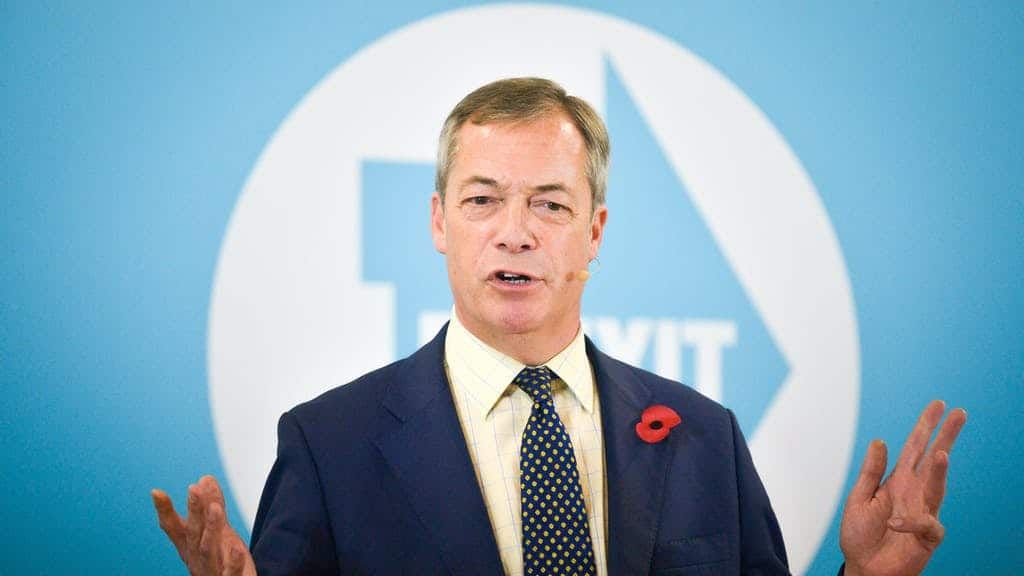Nigel Farage's Reform UK: Facing A Critical Crossroads

Table of Contents
Electoral Performance and Future Prospects
Reform UK's electoral performance has been a mixed bag. While it has achieved some notable successes, particularly in attracting votes from those dissatisfied with the Conservative and Labour parties, its overall impact on the national political scene remains limited. The party’s performance in the 2019 European Parliament elections saw a significant surge in support, showcasing its potential to mobilize a specific segment of the electorate. However, subsequent local and national elections have yielded less impressive results.
- Analysis of vote share in key elections: Reform UK's share of the vote has fluctuated significantly, demonstrating the challenges of translating initial support into consistent electoral success. A detailed analysis of vote share in key constituencies across different election cycles is necessary to accurately assess its overall trajectory.
- Comparison with other right-wing parties: The party faces stiff competition from established right-wing parties like the Conservatives and the Brexit Party (now defunct), making it challenging to establish a clear identity and attract voters. A comparison of policy positions and electoral strategies is essential to understand Reform UK's competitive advantage, or lack thereof.
- Assessment of future electability: Reform UK's future electability hinges on its ability to broaden its appeal beyond its core base of supporters. This requires strategic adjustments in messaging, policy development and campaign outreach to secure a broader appeal.
- Discussion of potential coalition opportunities: While currently unlikely, future coalition opportunities could significantly impact Reform UK's influence. An analysis of potential political alliances and their feasibility given Reform UK's current policy stance is needed.
Internal Challenges and Leadership
The stability of Reform UK's leadership and internal dynamics are crucial factors influencing its success. While Nigel Farage's charismatic leadership initially propelled the party forward, internal cohesion and factionalism pose ongoing challenges. The party's organizational structure and decision-making processes will need to adapt to accommodate growth and maintain internal harmony.
- Overview of key figures in Reform UK: Understanding the key individuals driving the party's agenda is essential to assessing its direction and stability. Analysis of the roles and influence of key figures within the party reveals the potential for internal power struggles.
- Analysis of leadership style and effectiveness: Nigel Farage's leadership style, known for its populist rhetoric and confrontational approach, may appeal to some but alienate others. Evaluating the effectiveness of this style in the context of political strategy and public perception is crucial.
- Examination of potential internal power struggles: The potential for internal conflicts within Reform UK demands a thorough examination, as internal divisions can significantly undermine its overall effectiveness and public image.
- Assessment of the party's organizational structure: A strong organizational structure is critical for a political party to effectively campaign, manage resources, and coordinate activities. Assessing the efficiency and effectiveness of Reform UK’s organizational structure offers insights into its potential for growth.
Policy Positions and Public Perception
Reform UK's core policy positions revolve around issues like Brexit, immigration, and economic reform. The party advocates for a complete break from the European Union, stricter immigration controls, and a more laissez-faire economic approach. However, public perception of these policies varies greatly, impacting the party's overall appeal.
- Detailed explanation of key policy stances: A comprehensive understanding of Reform UK's key policy positions, including their details and implications, is essential for analyzing their potential impact.
- Public opinion polls and surveys on Reform UK policies: Analyzing public opinion data is vital in assessing public support for the party’s policies and identifying areas where adjustments to their messaging and policy development may be needed.
- Analysis of media coverage and its impact: The media plays a significant role in shaping public perception. Analyzing media coverage of Reform UK and its policies helps to understand how the party is perceived by the wider public.
- Discussion of the party's brand image and reputation: Reform UK's brand image and reputation will determine its appeal to different segments of the electorate. Understanding this image and developing strategies to improve it are critical.
The Broader Political Landscape and Competition
Reform UK operates within a dynamic and competitive political landscape. The party competes with established parties across the political spectrum, from the Conservatives and Labour to smaller right-wing factions. The upcoming general election will be crucial in determining its place within this landscape.
- Comparison with other parties' platforms and appeal: Comparing Reform UK’s platform and appeal with those of its main political competitors helps to highlight its strengths and weaknesses.
- Assessment of Reform UK's ability to differentiate itself: In a crowded political field, differentiation is crucial. Analyzing Reform UK’s attempts to stand out from other parties is critical in assessing its potential for success.
- Discussion of the impact of potential future alliances: Political alliances can be game-changers, especially in a multi-party system. Analyzing the potential impact of future alliances on Reform UK’s position is crucial.
- Examination of potential electoral scenarios: Forecasting the impact of various electoral scenarios provides a deeper understanding of Reform UK’s potential to affect the outcome of future elections.
Conclusion: The Future of Reform UK: A Pivotal Moment
Reform UK stands at a pivotal moment. Its future success hinges on navigating internal challenges, refining its policy positions, and effectively communicating its message to a broader electorate. While the party has shown potential to mobilize a significant segment of the population, sustained electoral success requires strategic adaptation and a cohesive vision for the future. The party's ability to overcome its challenges and capitalize on opportunities will shape its lasting impact on British politics. To learn more about Reform UK's activities and future plans, visit their website and follow them on social media. Understanding the trajectory of Reform UK’s influence is crucial to understanding the future of British politics and the impact of Nigel Farage’s Reform UK.

Featured Posts
-
 Cubs Pirates Game Fan Hospitalized After Outfield Wall Fall
May 03, 2025
Cubs Pirates Game Fan Hospitalized After Outfield Wall Fall
May 03, 2025 -
 Pm Modi To Co Chair Ai Summit Address Business Leaders In France
May 03, 2025
Pm Modi To Co Chair Ai Summit Address Business Leaders In France
May 03, 2025 -
 Google Search Faces Existential Threat Sundar Pichais Doj Antitrust Concerns
May 03, 2025
Google Search Faces Existential Threat Sundar Pichais Doj Antitrust Concerns
May 03, 2025 -
 Farages New Reform Slogan A Controversial Jimmy Savile Reference
May 03, 2025
Farages New Reform Slogan A Controversial Jimmy Savile Reference
May 03, 2025 -
 Farages Whats App Leaks Trigger Integrity Crisis In Reform Party
May 03, 2025
Farages Whats App Leaks Trigger Integrity Crisis In Reform Party
May 03, 2025
